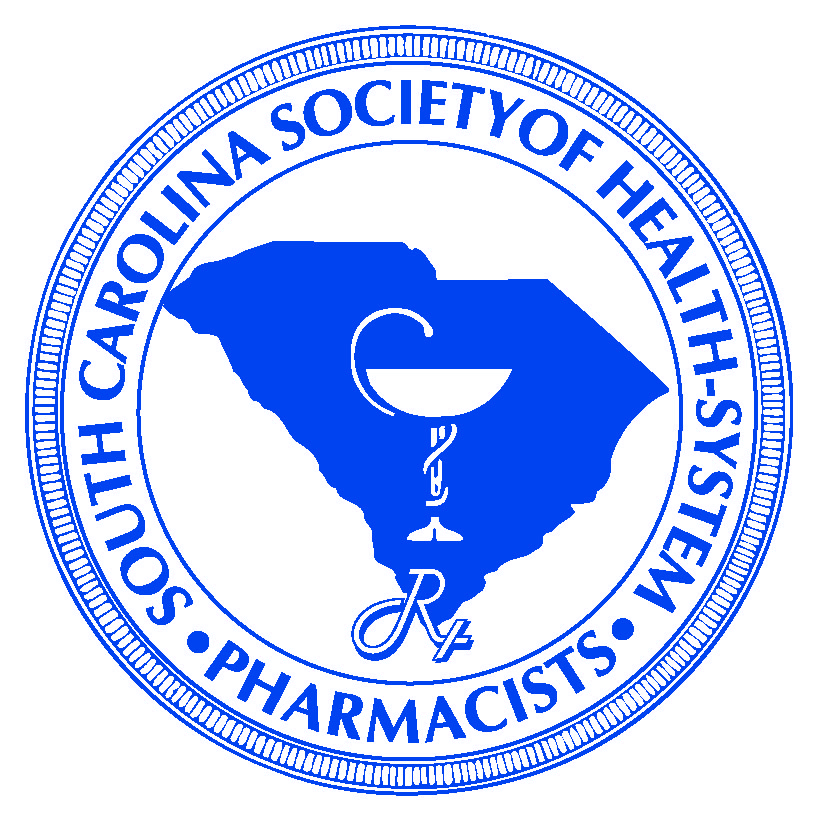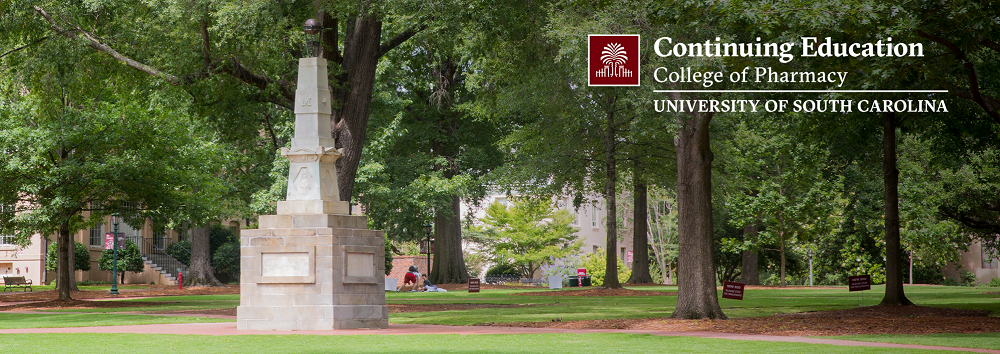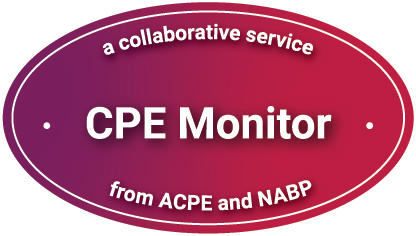
Date: Mar 3, 2022 08:00 AM - Mar 4, 2022 05:30 PM
CE Hours
CE Units
Activity Type
- Knowledge-Based and Application-Based
Target Audience(s)
- Pharmacists
- Pharmacy Technicians
Accreditation(s)

|
The University of South Carolina College of Pharmacy is accredited by the Accreditation Council for Pharmacy Education as a provider of continuing pharmacy education.
|
Co-Sponsor(s)
Requirements for CE Credit
- Check in upon arrival at the meeting
- Complete the online program evaluations
- Provide the correct month and day of birth and NABP e-Profile ID. Registration with a proper disclosure of your NABP E-Profile ID is a requirement for receiving Continuing Pharmacy Education. To register with or look up your NABP e-Profile ID, please click on the CPE Monitor logo below to be directed to their site.
- Explain the mechanism of SGLT2i for CKD
- Critically evaluate the published literature of renal outcomes regarding SGLT2i for CKD
- Formulate a person-centered treatment plan with monitoring parameters for CKD
- Explain the mechanism of SGLT2i for CKD
- Summarize a potential benefit and risk of SGLT2i on renal outcomes for CKD
- Determine appropriate counseling points with a SGLT2i for a person with CKD
Speaker(s)/Author(s)
|
Jennifer Clements, PharmD, FCCP, FADCES, BCPS, CDCES, BCACP, BC-ADM
|
Activity Number
0062-9999-22-065-L01-P/TCE Hours
- Distinguish between professional and personal CGMs
- Describe the characteristics of the different professional CGMs on the market
- Define the role of a pharmacist in the implementation and interpretation of professional CGMs
- Evaluate the effectiveness of professional CGMs in diabetes management
Speaker(s)/Author(s)
|
Aly York, PharmD
|
|
|
Lawrence Bean, PharmD
|
Activity Number
0062-9999-22-066-L01-P/TCE Hours
- Recall pharmacy trivia related to pharmacology, pharmacokinetics, pharmacodynamics, pharmacogenomics, clinical pharmacy history, biostatistics, and health outcomes
- Summarize clinical knowledge in response to a case vignette using supporting laboratory, physical examination, and medical history information
- Discuss numerous drug therapy and specialty areas through response to pharmacotherapy questions
Activity Number
0062-9999-22-067-L01-P/TCE Hours
- Discuss emerging research outcomes from throughout the state of South Carolina
- Recognize novel ideas for research and quality initiative projects in your pharmacy practice areas
- Review pivotal results from local investigations across the state of South Carolina
Speaker(s)/Author(s)
|
Carly Huggins, PharmD Candidate 2022
|
|
|
Gadison Quick, PharmD
|
|
|
Rachel Robinson, PharmD Candidate
|
Activity Number
0062-9999-22-068-L01-P/TCE Hours
- Recall pharmacy trivia related to pharmacology, pharmacokinetics, pharmacodynamics, pharmacogenomics, clinical pharmacy history, biostatistics, and health outcomes
- Summarize clinical knowledge in response to a case vignette using supporting laboratory, physical examination, and medical history information
- Discuss numerous drug therapy and specialty areas through response to pharmacotherapy questions
Activity Number
0062-9999-22-069-L01-P/TCE Hours
- Differentiate between the types of heart failure (HF)
- Describe the pathophysiology of HF
- Examine the historical pharmacologic management of Heart failure with preserved ejection fraction (HFpEF)
- Analyze recent primary literature related to the management of HFpEF
- Develop a treatment plan with monitoring when given a patient scenario with HFpEF
Speaker(s)/Author(s)
|
Katy Wolfe, PharmD
|
|
|
Sanyia Khan, PharmD
|
Activity Number
0062-9999-22-070-L01-P/TCE Hours
- Summarize the efficacy and safety of cabotegravir/rilpivirine long-acting injectable for HIV treatment
- Describe the workflow of implementing cabotegravir/rilpivirine long-acting injectable into real-world practice
- Apply current recommendations regarding cabotegravir/rilpivirine long-acting injectable for the treatment of HIV
Speaker(s)/Author(s)
|
Morgan Pizzuti, PharmD
|
|
|
Y. Vivian Tsai, PharmD
|
Activity Number
0062-9999-22-071-L02-P/TCE Hours
- Describe the pathophysiology and clinical presentation of diabetic ketoacidosis (DKA)
- Identify electrolyte disturbances often associated with DKA
- Review treatment guidelines for DKA
- Evaluate recent literature for selection of IV fluids in treatment of DKA
- Define euglycemic DKA and the risks associated with sodium-glucose cotransporter-2 (SGLT2) inhibitors
- Describe the presentation of diabetic ketoacidosis (DKA)
- Identify electrolyte disturbances often associated with DKA
- Recognize therapeutic options for DKA
Speaker(s)/Author(s)
|
Amanda Guffey, PharmD, BCCCP, BCPS
|
Activity Number
0062-9999-22-072-L01-P/TCE Hours
- Describe the role of antiplatelets in the pathophysiology of coronary artery disease
- Assess patient-specific characteristics, including ischemic and bleeding risks, to evaluate selection of antiplatelet management
- Examine guidelines and clinical trial recommendations for P2Y12 inhibitor selection, duration, and dose in acute coronary syndromes
- Develop an individualized, patient-center approach regarding antiplatelet management in coronary artery disease
- Describe the role of antiplatelets in the pathophysiology of coronary artery disease
- Recognize patient-specific characteristics that impact the selection of antiplatelet management
- Discuss the role of shared decision making in the treatment of coronary artery disease
Speaker(s)/Author(s)
|
Ashley Costello, PharmD, BCPS
|
Activity Number
0062-9999-22-073-L01-P/TCE Hours
- Review the microbiology, pathogenicity, and common mechanisms of resistance of Pseudomonas aeruginosa
- List the typical antibiotics utilized to treat Pseudomonas infections
- Evaluate the guidelines and other literature surrounding the treatment of Pseudomonas infections
Speaker(s)/Author(s)
|
Michael K. Shaw, PharmD
|
Activity Number
0062-9999-22-074-L01-P/TCE Hours
- Describe mechanisms of action and mechanisms of resistance to new antimicrobial agents including eravacycline, imipenem/cilastatin/relebactam, and cefiderocol
- Evaluate in vitro literature for these agents as well as clinical trials
- Select an antimicrobial agent based on resistance patterns, type of infection, and strength of clinical evidence
- Recall the mechanisms of action and mechanisms of resistance to new antimicrobial agents
- Recognize pharmacologic management strategies for resistant microbial infections
Speaker(s)/Author(s)
|
Kelli R. Keats, PharmD, MPA, BCCCP
|
Activity Number
0062-9999-22-075-L01-P/TCE Hours
- Evaluate the difference between major and non-major bleeding
- Summarize current pharmacological interventions for antithrombotic reversal
- Demonstrate understanding of antithrombotic reversal agent mechanisms of action
- Review literature regarding controversies related to antithrombotic reversal
Speaker(s)/Author(s)
|
Katrina Phelps, PharmD
|
Activity Number
0062-9999-22-076-L01-P/TCE Hours
- Compare and contrast eligibility criteria for thrombolytic therapy in acute ischemic stroke patients on the basis of emerging literature
- Interpret the role and supporting evidence behind tenecteplase as an alternative to traditional thrombolytic treatment of stroke
- Describe endovascular treatments for ischemic stroke, indications for use, eligibility of patients, and the concomitant use of thrombolytics
- Develop treatment recommendations incorporating appropriate diagnostic modalities for a patient presenting with stroke-like symptoms
- List common eligibility criteria for thrombolytic therapy in acute ischemic stroke
- Describe the dosing and administration of tenecteplase for stroke treatment
- Recognize non-pharmacologic treatments for ischemic stroke and the role for thrombolysis in patients undergoing endovascular therapies
- Outline treatment recommendations for the management of acute ischemic stroke
Speaker(s)/Author(s)
|
Charles “Trey” Wingerson III, PharmD
|
|
|
Jimmy L. Pruitt III, PharmD, BCPS
|

